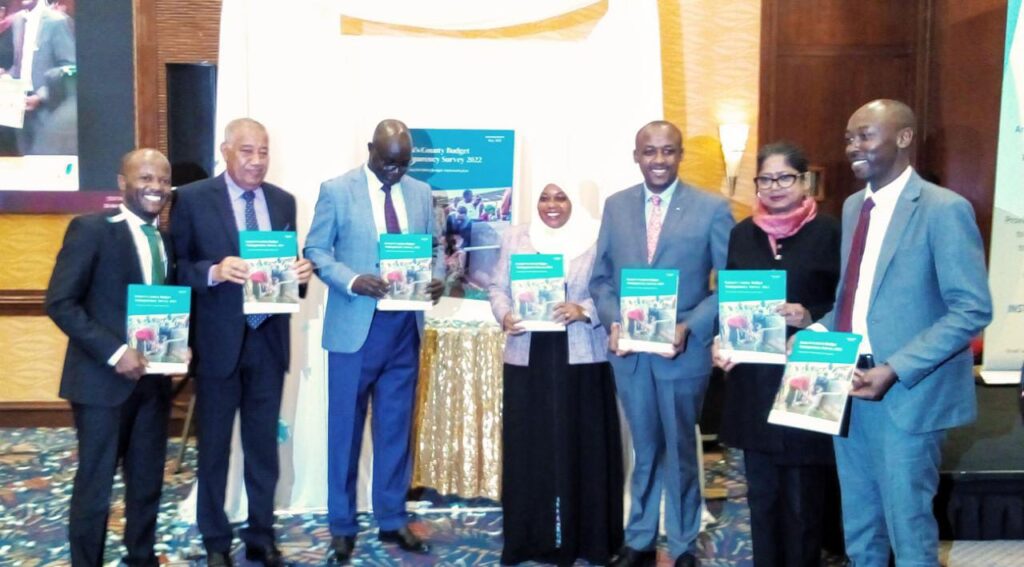West Pokot tops in IBP Kenya’s County Budget Transparency Survey

The International Budget Partnership Kenya (IBP Kenya) has today launched the County Budget Transparency Survey (CBTS) 2022.
“Transparency for better budget implementation” highlights the level of transparency by County Governments in the preparation and implementation of Budgets.
The Constitution of Kenya and the Public Finance Management (PFM) Act require each of the 47 counties in Kenya to publish and publicize budget documents throughout the budget cycle.
In a press statement released on Tuesday,These budget documents are supposed to help the public shape county priorities and monitor the implementation of budgets to ensure resources are reaching those who need them most.
The County Budget Transparency Survey evaluates the level of budget transparency across kenya’s 47 counties and scores the counties based on whether a county had its budget documents publicly available and on the level of information that was provided in those documents.
In the CBTS 2022, West Pokot, Makueni and Kwale emerged as the counties with the most transparent budgets. The three counties scored 78, 75 and 74 out of a possible 100 points, respectively. Kitui and Nyeri locked up the top five, scoring 69 points each.
Migori, Isiolo, Kajiado and Wajir were ranked as counties with the least transparent budgets, Scoring zero out of 100 points. Notably Migori and Isiolo have not published a single budget document in the last two rounds of the survey.
Compared to CBTS 2021 where only two Counties failed to publish a single budget document, in CBTS 2022 there were four counties
Kwale emerged as the most improved county by scoring 74 points, which was an improvement from a score of 23 points in the 2021 survey.
The regional blocs also recorded tremendous Improvements with Jumuia ya Kaunti za Pwani being the most improved with 52 out of 100 compared to 23 out of 100 in 2021.
Notably, all the Counties under Jumuia ya Kaunti za Pwani Improved their budget transparency scores in CBTS 2022 compared to CBTS 2021.
The Improvements could be attributed to more demand for budget information by the CSOs in the region.
According to Mr. Kipkorir Biegon, the Lead Researcher of the County Budget Transparency Survey at IBP Kenya, noted that the overall average transparency score was 41 points which was an Improvement from 35 points in CBTS 2021.
The substantial progress in budget transparency is as a result of 33 counties improving in CBTS 2022 compared to 24 counties in CBTS 2021.
Information on public participation remained the least published though there was an Improvement of 2 points in CBTS 2022 compared to CBTS 2021 when score was 8 out of 100 Points.
As a good practice county should adopt publishing feedback on public participation with disaggregated information on who was involved, public inputs, and feedback on the decisions Informed by public inputs.
“In the CBTS 2022, 41 budget documents which counties had previously published in CBTS 2021 were not published.
Based on these findings, there is need for counties to sustain the gains realized by consistently publishing budget documents which they are previously availed.” Said Biegon.
Counties have an opportunity to learn from each other since in every regional bloc there were counties that were in the ‘B’ category.
These Counties can offer good practices for peer learning within the regional economic bloc which will in turn translate to improved counties score as well as the overall regional bloc score.
Only 8 counties published all the 4 quarterly budget implementation reports required in a financial year 2021/22 in the CBTS 2022.
This shows a worrying trend since based on the findings from the three surveys, information on implementation budget implementation remains the least published compared to information on formulation and approval.
“By not publishing implementation reports, Kenya’s counties are missing out on an important opportunity to communicate with the public on how and whether spending is reaching its Intended targets, as well as any relevant changes in priorities,” said Dr Rugo.
“By promoting the principles of transparency and public participation anchored in the PFM Act counties can enhance their credibility by building a community of citizens that are actively involved in budget processes and can hold their governments to account.” Said Dr Rugo.




